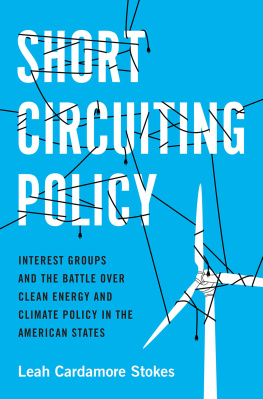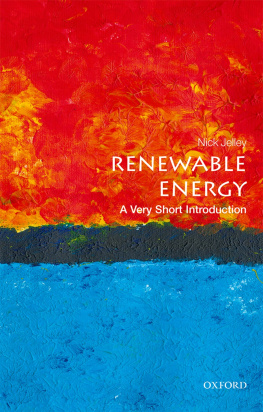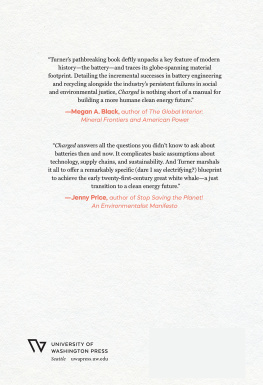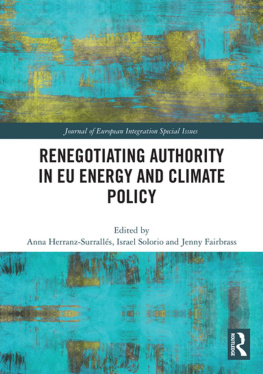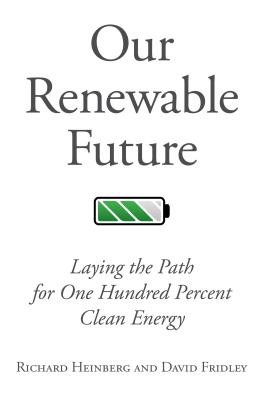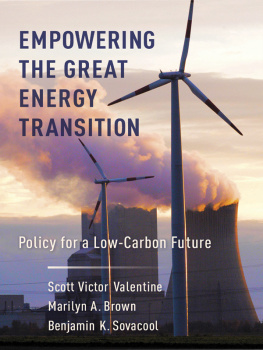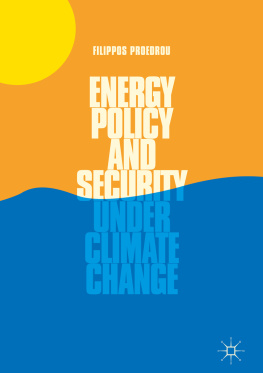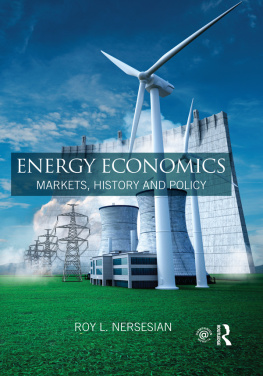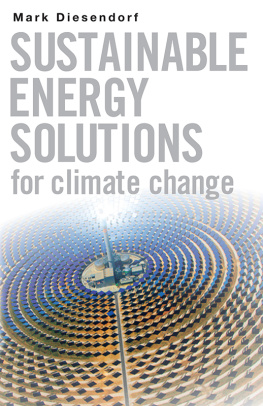Short Circuiting Policy
STUDIES IN POSTWAR AMERICAN POLITICAL DEVELOPMENT
Steven Teles, Series Editor
Series Board Members
Jennifer Hochschild
Desmond King
Sanford Levinson
Taeku Lee
Shep Melnick
Paul Pierson
John Skrentny
Adam Sheingate
Reva Siegel
Thomas Sugrue
Ideas With Consequences: The Federalist Society and the Conservative Counterrevolution
Amanda Hollis-Brusky
No Day in Court: Access to Justice and the Politics of Judicial Retrenchment
Sarah Staszak
The Business of America Is Lobbying: How Corporations Became Politicized and Politics Became More Corporate
Lee Drutman
Building a Business of Politics: The Rise of Political Consulting and the Transformation of American Democracy
Adam Sheingate
Prison Break: Why Conservatives Turned Against Mass Incarceration
David Dagan and Steven Teles
The Other Rights Revolution: Conservative Lawyers and the Remaking of American Government
Jefferson Decker
When Bad Policy Makes Good Politics: Running the Numbers on Health Reform
Robert P. Saldin
Citizens by Degree: Higher Education Policy and the Changing Gender Dynamics of American Citizenship
Deondra Rose
Politics at Work: How Companies Turn Their Workers Into Lobbyists
Alexander Hertel-Fernandez
The Cities on the Hill: How Urban Institutions Transformed National Politics
Thomas K. Ogorzalek
Framing Inequality: Media, Public Opinion, and the Neoliberal Turn in U.S. Public Policy
Matthew Guardino
Mobilized by Injustice: Criminal Justice Contact, Political Participation, and Race
Hannah L. Walker
Short Circuiting Policy: Interest Groups and the Battle Over Clean Energy and Climate Policy in the American States
Leah Cardamore Stokes

Oxford University Press is a department of the University of Oxford. It furthers the Universitys objective of excellence in research, scholarship, and education by publishing worldwide. Oxford is a registered trade mark of Oxford University Press in the UK and certain other countries.
Published in the United States of America by Oxford University Press
198 Madison Avenue, New York, NY 10016, United States of America.
Oxford University Press 2020
All rights reserved. No part of this publication may be reproduced, stored in a retrieval system, or transmitted, in any form or by any means, without the prior permission in writing of Oxford University Press, or as expressly permitted by law, by license, or under terms agreed with the appropriate reproduction rights organization. Inquiries concerning reproduction outside the scope of the above should be sent to the Rights Department, Oxford University Press, at the address above.
You must not circulate this work in any other form and you must impose this same condition on any acquirer.
Library of Congress Cataloging-in-Publication Data
Names: Stokes, Leah Cardamore, author.
Title: Short circuiting policy : interest groups and the battle over clean
energy and climate policy in the American states / Leah Cardamore Stokes.
Description: New York, NY : Oxford University Press, [2020] |
Series: Studies in postwar American political development |
Includes bibliographical references and index.
Identifiers: LCCN 2019047241 (print) | LCCN 2019047242 (ebook) |
ISBN 9780190074265 (paperback) | ISBN 9780190074258 (hardback) |
ISBN 9780190074289 (epub) | ISBN 9780190074296 (OSO)
Subjects: LCSH: Energy policyUnited StatesStatesCase studies. |
Clean energyGovernment policyUnited StatesStatesCase studies. |
Climatic changesPolitical aspectsUnited StatesStatesCase studies. |
LobbyingUnited StatesStatesCase studies. |
Pressure groupsUnited StatesStatesCase studies.
Classification: LCC HD9502. U52 S8299 2020 (print) |
LCC HD9502.U 52 (ebook) | DDC 333.7 90973dc23
LC record available at https://lccn.loc.gov/2019047241
LC ebook record available at https://lccn.loc.gov/2019047242
This book is dedicated to all living beings.
May the fossil fuel era end.
Contents
Something is wrong, I know it, if I dont keep my attention on eternity. May I be the tiniest nail in the house of the universe, tiny but useful. May I stay forever in the stream. May I look down upon the windflower and the bull thistle and the coreopsis with the greatest respect.
Mary Oliver
This book began as a dissertation at the Massachusetts Institute of Technology (MIT). For a strange and unknowable reason, Larry Susskind, Judy Layzer and JoAnn Carmin saw fit to admit me to a PhD at MIT a decade ago. That decision altered the course of my life, like a river finding a new route. The five years I spent at MIT found me taking courses in planning, political science, public policy, engineering, and science. Traipsing across campus, from department to department, made it possible for me to understand the energy system in a deep way, and through it, grasp the climate crisis. My many mentors at MIT included Larry Susskind, Judy Layzer, Andrea Campbell and Chris Warshaw, who advised my dissertation, as well as Noelle Selin, Jessika Trancik, Henry Lee, Ignacio Perez-Arriaga, Kathy Thelen, Deborah Stone, Danny Hidalgo, Jens Hainmueller, Ken Oye, and Adam Berinsky. It was a moment in time in a very specific place. I will spend the rest of my life deepening the foundation of knowledge I laid while I was there.
Over the seven years it took to write this book, I had an enormous amount of help from research assistants. Jeff Feng was my right hand as I revised, always ready to complete yet another fact check. Rebecca Garverman was instrumental during the field work. Sydney Bartone appeared right when I needed her, helping me push this book over the finish line. Patrick Hunnicutt, Geoff Henderson, Lillian Zhou, Nikayla Jefferson, Sabrina McGraw, Rebecca Sugrue, and Kathryn Buggs all provided invaluable research support.
When I moved to the University of California, Santa Barbara, I gained a deep bench of colleagues on environmental politics: Eric Smith, Hahrie Han, Paasha Mahdavi, Sarah Anderson, Mark Buntaine, Matt Potoski, David Pellow, and Matto Mildenberger all provided inspiration for the work. Several of these colleagues also helped me organize a book workshop on campus, providing valuable feedback. Larry Jacobs, Paul Pierson, Andrea Campbell, and Alex Hertel-Fernandez went out of their way to attend the workshop, giving me sound advice on the project. Others provided valuable feedback on drafts, including: Michael Aklin, Dave Anderson, Parrish Bergquist, Gabe Chan, Colin Cunliff, Ranjit Deshmukh, Chase Foster, Kristin Goss, Jake Grumbach, Richard Hirsh, Jesse Jenkins, Matt Kasper, Robert Keohane, Robert Lifset, Kate Marvel, Alan Nogee, Eric Patashnik, David Pomerantz, Tobias Schmidt, Narayan Subramanian, and David Vogel.
Where would we be without our friends, our companions who walk beside us along the slow road to academic publication? By a strange stroke of fortune, I gained five best friends while writing this book: Hanna Breetz, Laura Chirot, Chad Hazlett, Alex Hertel-Fernandez, and Trish Tan. My time at MIT was full of friendships across campus and Cambridge, including: Isabelle Anguelovski, Kathy Araujo, Parrish Bergquist, Eric Chu, Ross Collins, Ryan Cook, Ellen Czaika, Justin de Benedictis-Kessner, Dan de Kadt, Graham Denyer Willis, Pearl Donohoo, Greg Epstein, Chase Foster, Amanda Giang, Kian Goh, Alicia Harley, Kelly Heber, Devin Helfrich, Claire Houston, Jason Jackson, Chris Jones, Lily Knorr, Vig Krishnamurthy, Christa Lee-Chuvala, Megan Lickley, Krista Loose, Nick Marantz, Claudia Octaviano, Kelly Pasolli, Jackie Piltch, Lily Pollans, Danya Rumore, Rebecca Saari, Nidhi Santen, Todd Schenk, Alexis Schulman, Linda Shi, Chris Smith, Abby Spinak, Kerry Spitzer, Mia White, Tess Wise, Patricio Zambrano-Barragan, and Laurie Zapalac. When I moved to Santa Barbara, I made some new friends, chiefly Kathy Burba, who never failed to ask if Id finished my book yet (I had not). I also had the great fortune to meet Lacey Baldiviez, Kathryn Barnes, Katie Hershfelt, Megan Mahdavi, Briana McCarthy, Samantha Narang, Ryoko Oono, Tannis Thorlakson, and an entire community at Friday ceramics with the great Bernie Sayers. And to my friends who knew me before this adventure began and saw me through the process: Bernice Chau, Amy Gordon, Sandy Hudson and Danielle Westbrook. Thank you also to Lynn Bratman, Olivia Scobie and Beth Sternlieb for having my back and lighting the way.

